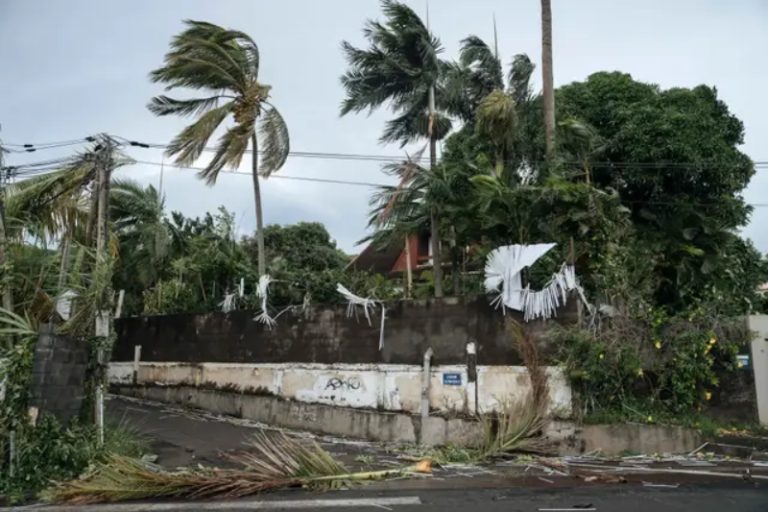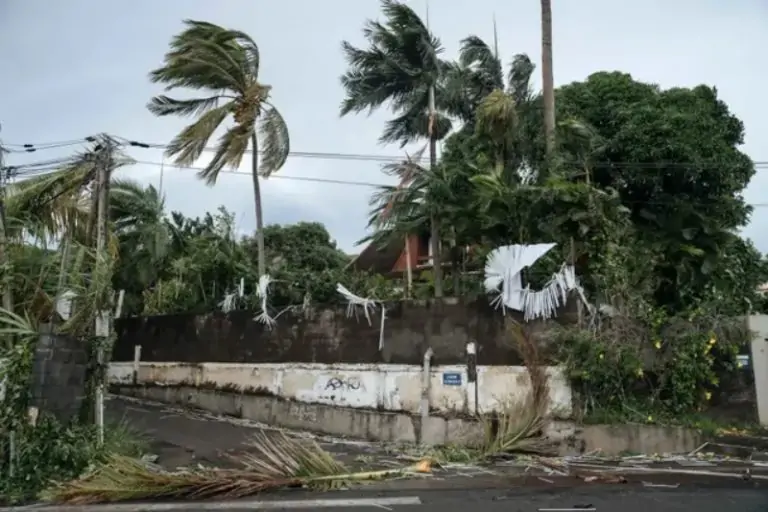

tropical cyclone belal strikes reunion prompts alerts in mauritius
Tropical Cyclone Belal made landfall on the island of Reunion in the Indian Ocean, unleashing heavy rain and strong winds that left a quarter of the island’s homes without electricity and tens of thousands facing water shortages. Although the highest alert level, the purple alert, has been lifted, local authorities urge residents to remain indoors. Despite Belal’s intensity gradually diminishing, winds of up to 170 km/h (105 mph) continue to batter the island.
The Prefecture of Reunion reported that Belal brought waves reaching approximately 8 meters (26 feet) in height and caused widespread disruptions, including the loss of internet and phone services. Tragically, a homeless individual outside of a shelter was found dead in Saint-Gilles on the western shore. The circumstances surrounding the death remain unclear. Emergency services were on lockdown during the storm, and the population was strongly advised to stay indoors.
Prefect Jérôme Filippini warned of potential flood surges not witnessed in a century, emphasizing the unprecedented threat the cyclone posed. Meteorologists expressed concerns that Belal could be the most catastrophic storm to hit Reunion since the 1960s, underscoring the severity of the weather event.
While the purple alert has been lifted in Reunion, the neighboring island nation of Mauritius is on high alert. Authorities anticipate feeling the impact of Tropical Cyclone Belal as it continues its trajectory through the southwestern Indian Ocean. With heavy rains and strong winds expected, Mauritius remains vigilant, implementing precautionary measures to mitigate potential damage.
Cyclones are common in southern Africa between January and March, when the southern hemisphere experiences its warmest ocean temperatures. The fuel for cyclones lies in the warmer waters, contributing to their formation and intensity. Scientists note that human-induced climate change exacerbates extreme weather events, leading to more frequent cyclones and increased rainfall.
The devastating impact of Cyclone Idai in 2019 serves as a stark reminder of the vulnerability of the region to powerful storms. Moving from the Indian Ocean to southern Africa, Cyclone Idai triggered a humanitarian disaster, claiming over a thousand lives in Mozambique, Malawi, and Zimbabwe. The United Nations identified it as one of the deadliest storms in the southern hemisphere.
As Tropical Cyclone Belal continues to influence the region, communities brace for potential challenges, emphasizing the need for proactive measures to safeguard lives and infrastructure.
South African President Cyril Ramaphosa defended his nation against claims of white discrimination made by tech magnate Elon Musk. After…
Hilton launched Signia by Hilton for its first appearance in Egypt and Africa through its hotel expansions. These hotels at…
UNICEF reported that, nearly 2900 people died of cholera across Eastern and Southern African countries while children suffer most greatly…
Enza, based in the United Arab Emirates, obtained $6.75 million in initial investment funding from Algebra Ventures and Quona Capital.…
US Secretary of State Marco Rubio ordered South African Ambassador Ebrahim Rasool to leave America by March 21 because he…
Early 2025 ends with IPL fever in India and cricket fans receive good news of an international schedule full of…
This website uses cookies.